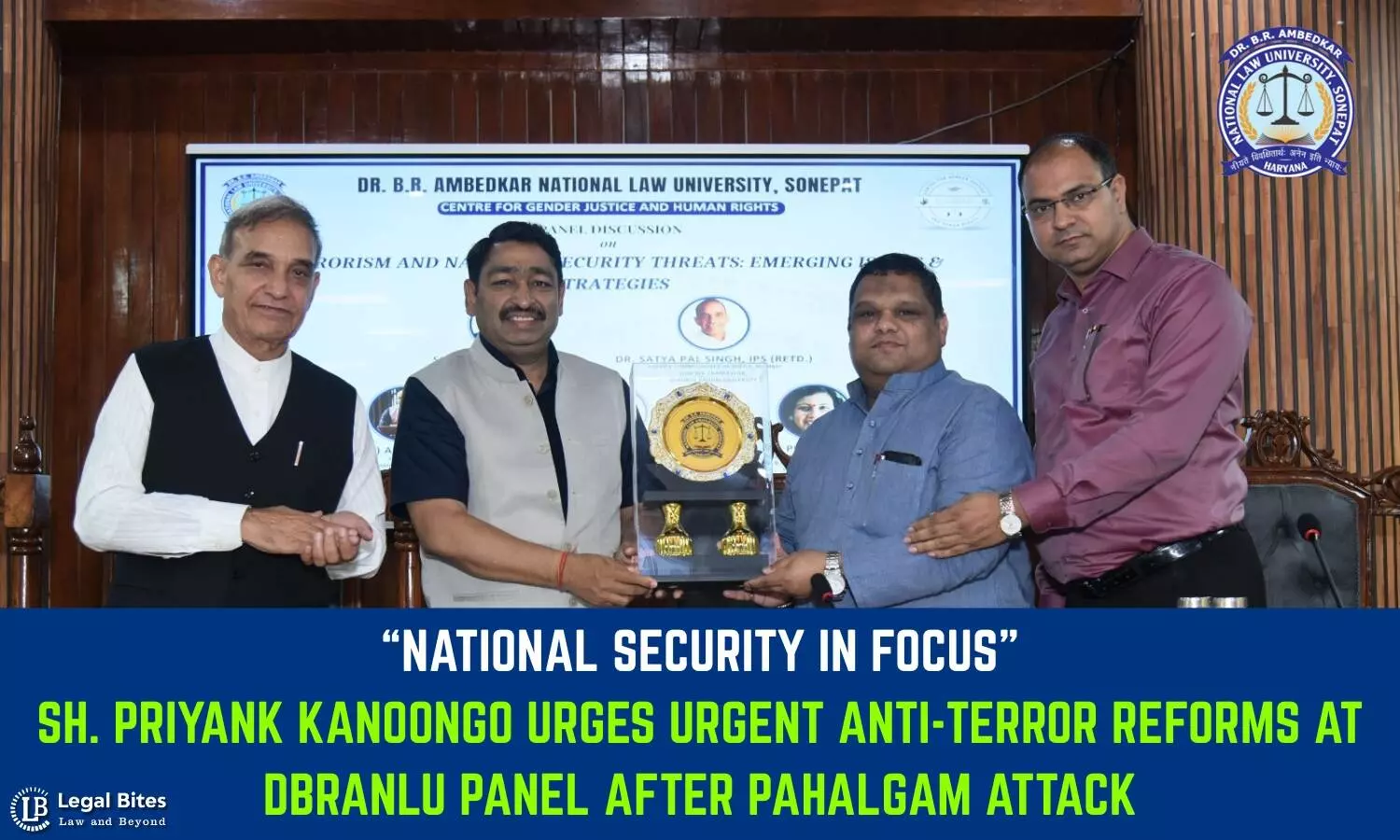
Sonipat, May 9, 2025 | Legal Bites News Desk — In a powerful call to action following the recent Pahalgam terror attack, Shri Priyank Kanoongo, Hon’ble Member of the National Human Rights Commission of India (NHRC), emphasized the urgent need for a proactive and rights-based national security strategy during a high-level panel discussion at Dr. B.R. Ambedkar National Law University (DBRANLU), Sonipat.
The panel discussion titled “Terrorism and National Security: Emerging Issues and Strategies” drew experts, academicians, and law enforcement veterans to deliberate on India’s counter-terrorism roadmap.
Priyank Kanoongo: Rights-Based Strategy Crucial for National Security
Addressing the panel, Shri Kanoongo strongly condemned the Pahalgam incident, calling it “an inhuman act targeting innocent civilians based on their religion.” He stressed that preventing radicalization and protecting human rights must go hand-in-hand with combating terrorism.
“Terrorism cannot be tackled by reactive force alone. We must build structures that prevent radicalisation and safeguard the rights of citizens without compromising security,” he said, drawing parallels with global shifts in policy post-9/11.
His remarks also touched upon the psychological and social impacts of terrorism, advocating for institutional cooperation, community engagement, and targeted policy-making.
DBRANLU Vice-Chancellor Prof. Ashok Kumar Applauds Armed Forces’ Response
Chairing the event, Prof. (Dr.) Ashok Kumar, Vice-Chancellor of DBRANLU, lauded the Indian Army’s swift response to the Pahalgam tragedy. He described the destruction of terror camps across the border as a moment of national pride.
“Our armed forces demolished enemy hideouts in a swift response this morning. This was not just retaliation—it was justice for the victims of the Pahalgam massacre,” said Prof. Kumar.
He also addressed Pakistan’s history of aggression and China’s covert role in destabilizing the region through proxy actors.
Dr. Satyapal Singh: Eliminate Terror Support Networks
Adding to the discussion, Dr. Satyapal Singh, IPS (Retd.), Former Commissioner of Police, Mumbai, and Chancellor of Gurukul Kangri University, Haridwar, stressed that dismantling ideological and financial networks is key.
“We must also dismantle the ideological and financial networks that misguide young minds—some as young as 13—into terrorism,” he warned.
Prof. Ashutosh Mishra: Internal Threats Pose Greater Danger
Prof. (Dr.) Ashutosh Mishra, Registrar of DBRANLU, highlighted the danger posed by domestic enablers of terrorism, calling them a greater threat than external actors.
“Internal threats can be more dangerous than enemies across the border. We must remain vigilant and united to protect our national integrity,” he noted.
Faculty Engagement and Student Participation
The session witnessed enthusiastic participation from both students and faculty members, creating a vibrant academic environment for critical dialogue on national security. Distinguished guests, including Shri Priyank Kanoongo and Dr. Satyapal Singh, were honoured with mementos as a token of appreciation. Among the faculty who actively engaged in the discussions were Dr. Pooja Jaiswal, Dean of Academic Affairs, along with Dr. Balwinder Kaur, Dr. Sukhwinder Singh, Dr. Sunder Singh, Dr. Madhukar Sharma, and Dr. Sanjay Kumar. Their presence, alongside the keen involvement of students, underscored DBRANLU’s commitment to fostering informed discourse on pressing national issues.
Way Forward
The DBRANLU panel served as a vital platform to raise awareness about evolving security threats and the importance of multi-pronged, preventive strategies that uphold both national integrity and human rights. As India continues to face complex internal and external threats, the voices from this discussion underscore the need for reform, vigilance, and united action.